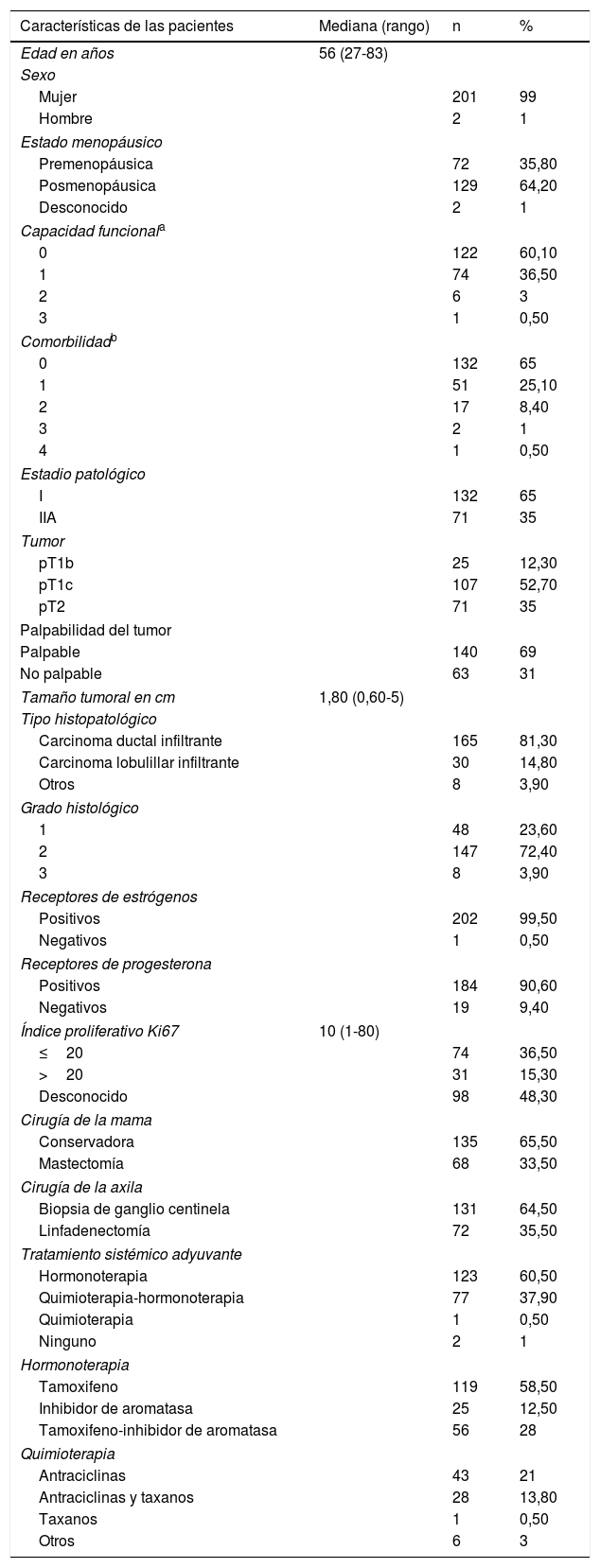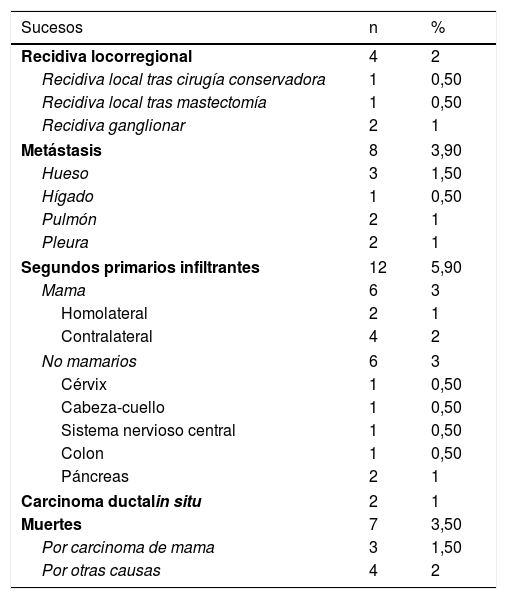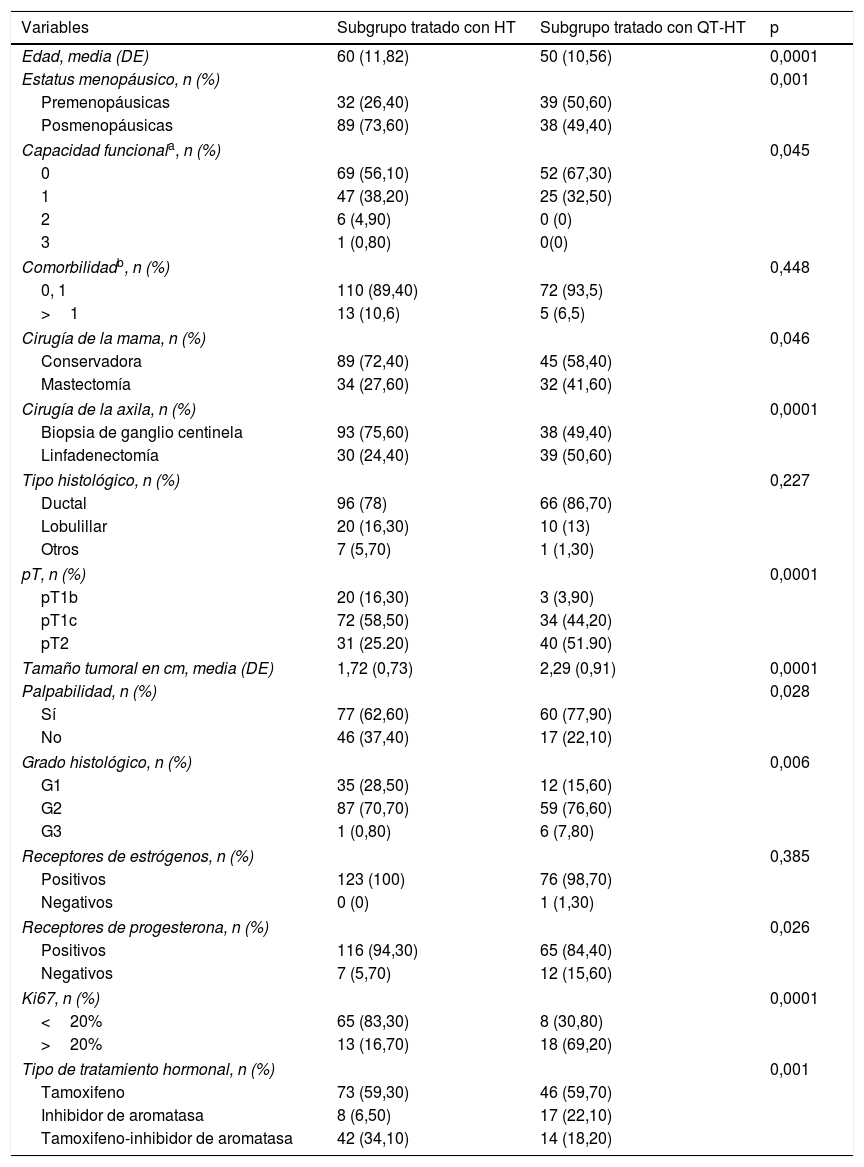En el cáncer de mama hormonosensible, HER-2 negativo, con ganglios negativos, la presencia de un riesgo genómico bajo permite tratar solo con hormonoterapia adyuvante, obteniendo unas excelentes tasas de supervivencia. La justificación de este estudio es demostrar que también se obtienen unas excelentes tasas de supervivencia tratando solo con hormonoterapia adyuvante mediante la evaluación del riesgo clínico.
Pacientes y métodosEstudio descriptivo, observacional y retrospectivo entre 2006 y 2016 de la cohorte de cáncer de mama hormonosensible, HER-2 negativo, con ganglios negativos, tamaño del tumor mayor de 1cm o entre 0,6 y 1cm con características desfavorables. Revisión retrospectiva de los registros de salud. Datos de mortalidad del Registro Nacional de Defunciones.
ResultadosUn total de 203 pacientes fueron evaluables para la supervivencia. Ciento veintitrés (60,50%) fueron tratadas solo con hormonoterapia adyuvante, 77 (37,90%) con quimioterapia-hormonoterapia, una (0.50%) solo con quimioterapia y 2 (1%) no recibieron ningún tratamiento. La tasa de supervivencia global a los 5 años fue del 97% (intervalo de confianza [IC] del 95% 94-100). La tasa de intervalo libre de metástasis a distancia fue del 94% (IC 95% 90-98). En el subgrupo de pacientes tratadas solo con hormonoterapia la tasa de supervivencia global y del intervalo libre de metástasis a distancia a los 5 años fue del 98% (IC 95% 95-100) y 97% (IC 95% 93-100), respectivamente.
ConclusionesLas pacientes con cáncer de mama hormonosensible, HER-2-negativo, con ganglios negativos, tratadas solo con hormonoterapia según su riesgo clínico, obtienen resultados de supervivencia similares a los descritos cuando son tratadas solo con hormonoterapia según su riesgo genómico.
In endocrine-sensitive, HER-2 negative, node negative breast cancer, the presence of a low genomic risk allows treatment with adjuvant endocrine therapy alone, obtaining excellent survival rates. The justification for this study is to show that excellent survival rates are also obtained by treating with adjuvant hormone therapy alone, based on clinical risk assessment.
Patients and methodsA descriptive, observational and retrospective study was performed between 2006 and 2016 with endocrine-sensitive, HER-2 negative, node negative breast cancer, greater than 1cm or between 0.6 and 1cm with unfavourable features. Retrospective review of health records. Mortality data of the National Registry of Deaths.
ResultsA total of 203 patients were evaluable for survival. One hundred and twenty-three (60.50%) were treated with adjuvant endocrine therapy alone, 77 (37.90%) with chemotherapy and endocrine therapy, one (0.50%) with chemotherapy alone and 2 (1%) were not treated. The overall survival rate at 5 years was 97% (95% confidence interval [CI] 94-100). Distant recurrence-free interval was 94% (95% CI 90-98). In the subgroup of patients treated with endocrine therapy alone, overall survival and distant recurrence-free interval rates at 5 years were 98% (95% CI 95-100) and 97% (95% CI 93-100), respectively.
ConclusionsPatients with endocrine-sensitive, HER-2-negative, node negative breast cancer treated with endocrine therapy alone according to their clinical risk have similar survival outcomes as those treated with endocrine therapy according to their genomic risk.












